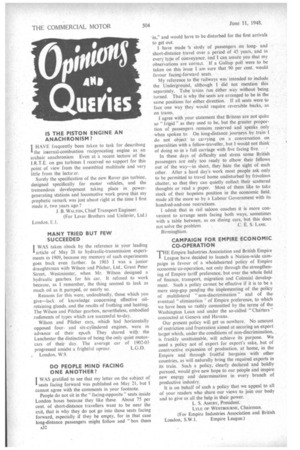IS THE PISTON ENGINE ANACHRONISM?
Page 34

If you've noticed an error in this article please click here to report it so we can fix it.
I HAVE frequently been taken to task for describing
the internal-combustion reciprocating engine as an archaic anachronism Even at a recent lecture of the 1.R.T.E. on gas turbines I received no support for this point of view from the assembled multitude and very little from the lectwer.
Surely the specification of the new Rover gas turbine, designed specifically for motor vehicles, and the tremendous development taking place in powergenerating stations and locomotive work prove that my prophetic remark was just about right at the time I first made it, two years ago ?
J. B. WALTON, Chief Transport Engineer. (For Lever Brothers and Unilever, Ltd.) London, 1.1.
MANY TRIED BUT FEW SUCCEEDED I WAS taken aback by the reference in your leading 'article of May 28 to hydraulic-transmission experiments in 1909, because my memory of such experiments goes back even farther. In 1903 I was a junior draughtsman with Wilson and Pitcher, Ltd., Great Peter Street, . Westminster, when Mr. Wilson designed a hydraulic gearbox for his car. It refused to work because, as I remember, the thing seemed to leak as much oil as it pumped, or nearly so.
Reasons for this were, undoubtedly, those which you give—lack of knowledge concerning effective oilretaining glands, and the results of frothing and heating. The Wilson and Pitcher gearbox, nevertheless, embodied. rudiments of types which are successful to-day.
Wilson and Pilcher cars, which had horizontally opposed fourand six-cylindered engines, were in advance of their epoch. They shared with the Lanchester the distinction of being the only quiet motorcars of their day. The average car of 1902-03 progressed amidst a frightful uproar. L.G.D. London, W.9.
DO PEOPLE MIND FACING ONE ANOTHER?
WAS gratified to see that my letter on the subject of seats facing forward was published on May 21, but I cannot agree with the comments in your footnote. People do not sit in the facing-opposite" seats inside London buses because they like these. About 75 per cent, of short-distance travellers want to be near the exit, that is why they do not go into those seats facing forward, especially if they be empty, for in that case long-distance passengers might follow and "box them A32 'in," and would have to be disturbed for the first arrivals to get out.
I have made sa study of passengers on longand short-distance travel over a period of 45 years, and in every tyPe of conveyance. and I can assure you that my observations arc correct. If a Gallup poll were to be taken on this issue I am sure that 90 per cent. would favour facing-forward seats.
My reference to the railways was intended to include the Underground, although I did not mention this separately. Tube trains run either way without being turned. That is why the: seats are arranged to be in the same positions for either direction. If all seats were to face one way theywould require reversible backs, as on trams.
I agree with your statement that Britons are not quite so " frigid " as they used to be, but the greater proportion of passengers remains reserved and speaks only when spoken to. On long-distance journeys by train I do not object to carrying on a conversation on generalities with a fellow-traveller, but I would not think of doing so in a full carriage with five facing five. • In these days of difficulty and stress some British passengers are only too ready to elbow their fellows out of the way—in short, they hate the sight of each other. After a hard day's work most people ask only to be permitted to travel home undisturbed by frivolous chatter, so that they can quietly collect their scattered thoughts or read a paper. Most of them like to take stock of their hopeless position in the economic field,• made all the more so by a Labour Government with its hundred-and-one restrictions.
admit that in rail saloon coaches it is more convenient to arrange seats facing both ways, sometimes with a table between, as on dining cars, but this does
not solve the problem. C. E. S. LANE. Birmingham.
CAMPAIGN FOR EMPIRE ECONOMIC CO-OPERATION THE Empire Industries Association and British Empire League have decided to launch a Nation-wide cam
paign in favour of a wholehearted policy of Empire economic co-operation, not only through the strengthening of Empire tariff preference, but over the whole field of finance, transport, migration and Colonial develop ment. Such a policy cannot be effective if it is to be a mere stop-gap pending the implementing of the policy of multilateral " non-discrimination " and of the eventual "elimination " of Empire preference, to which we have been so rashly committed by the terms of the Washington Loan and under the so-called Charters" concocted at Geneva and Havana.
Our present policy will get us nowhere. No amount of restriction and frustration aimed at securing an export target which, under the conditions of non-discrimination, is frankly unattainable, will achieve its purpose. We need a policy not of export for export's sake, but of constructive expansion of production, at home, in the Empire and through fruitful bargains with other countries, as will naturally bring the required exports in its train. Such a policy, clearly declared and boldly pursued, would give new hope to our people and inspire new energy and determination in every branch of productive industry.
It is on behalf of such a policy that we appeal to all of your readers who share our views to join our body and to give us all the help in their power.
L. S. AMERY, President.
(For Empire Industries Association and British London, S.W.I. Empire League.)
LYLE OF WESTBOURNE, Chairman.




















































































